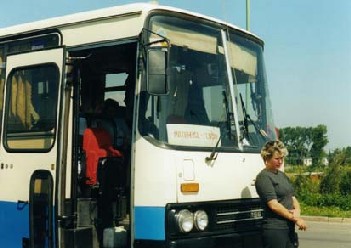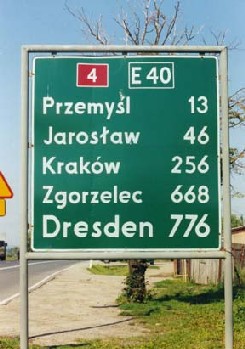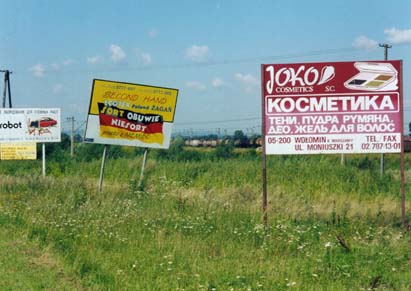| Return to main page |
It was five minutes to midnight when Dr. Dylagowa pulled up at
the border crossing. Even she, the driver, had not been exempted entirely
from the hospitality rituals. She had taken several wrong turns and was
not feeling well. The Professor and most of the students were asleep in
the minibus. Trying hard to overcome her nerves, she strode into the main
building. The daytime crowds had dwindled. Rubbish was scattered everywhere
and the smells were unpleasant. She looked for the official who had authorised
their entry to Ukraine that morning, but he was nowhere to be seen.
A different man addressed her brusquely. She did not understand what he said but at once handed over the passports of the group. He flicked slowly through the pages of each single one until he found the fresh Ukrainian stamp. Then he disappeared, without a word. Dr. Dylagowa began to feel afraid. She tried to return to the vehicle to consult the Professor, but an armed guard prevented her from leaving the building. This was another model of power, one to which, even though she had grown up in a communist system, she had not been personally exposed before. Then the passport official reappeared, accompanied by another man in uniform, presumably his superior. They shouted across to the customs officials, and two or three came sauntering across. Dr. Dylagowa then led this party to the minibus where, with some difficulty, she woke her husband and their students. The customs officers seized all of the leather coats at once and proceeded to examine every other item of luggage in the minibus. Dissatisfied with what they found, they began to search underneath the vehicle and to strike it with hard wooden sticks. When the Professor protested he was very quickly silenced. Then the whole group was marched off to a small room in a building at the rear of the complex, where armed soldiers protected the sole entrance.
'They're going to dismantle the whole bus,' sighed the Professor
'But why?' asked his wife. 'We haven't done anything. If only Jarek had come back with us, I'm sure he would have known what to do. I wondered if I should have tried to offer a bribe, but I was too scared it might just make matters worse.'
'Just don't worry,' said the Professor. 'Now you'll really have something to write in your journals. Perhaps I'll draft an article myself for 'Transnational Anthropology '- after all, what location could be more transnational than this one? ' But shortly after he said this, all their journals were collected and taken away by yet another official. By now the effects of the vodka were beginning to wear off. There was no room to sleep and everyone was exhausted and cold. The Professor tried to keep spirits up. He related lots of anecdotes from his own and other people's field research, including a few stories that showed Malinowski in a very dubious light. When Ania asked about the source of these scurrilous tales, the Professor said that they came partly from Malinowski's own diary, which had been published in 1967, though he had certainly never intended that it should be.
The Professor suggested that they while away the night with a debate about the concept of culture. His wife argued that, by invoking cultural differences, anthropologists had been able to counter those who wished to explain human diversity on racial grounds. It was crucial, she said, to preserve diversity in the face of globalisation. The Professor agreed that this was valuable but suggested that nowadays the term 'culture' was itself being used as 'race' had been in the past - except when it was being used in quite vacuous ways, to describe business enterprises, new fashions, or fads of political correctness. He invited the students to compare the generally positive way in which people used the concept of 'tradition' with the generally negative way in which they talked of 'post-communist nostalgia'. 'Can we deny that communism, too, developed the force of a tradition? We are experiencing a part of that right now, at this border post; but it also contained more attractive elements.' His wife protested: 'Surely there is a difference between a regime imposed by the military force of the former Soviet Union and, say, the traditions we associate with the province of Galicia, which date back a thousand years or more?'
'It's true,' said the Professor, 'that the name Galicia refers to a medieval Kingdom in this region. But that disappeared in the fourteenth century. The name was reinvented in the late eighteenth century, as part of the strategy of the Austrian Habsburgs to present themselves as the legitimate rulers of this territory. It became part of their mythology, if you like. You see, there is no such thing as a 'natural' Galician tradition, just a word that foreign powerholders found convenient to manipulate.'
'Would you say the same about 'Polish' and 'Ukrainian?' asked one of the students. 'Are they also to be seen as false traditions?'
'Well,' said the Professor, 'I don't want to argue that any traditions per se are false. Some may be based on understandings of the past that an historian might say were false, some might be based on values that I dislike, but as an anthropologist my starting point is to respect any tradition to which people are deeply attached, which gives them some sort of collective identity. It's clear today that the terms Polish and Ukrainian attract far stronger emotional loyalty than Galicia has ever done. But that need not prevent me from noting the historical evidence which shows that the mass acceptance of Polish and Ukrainian national identities is a very recent phenomenon.'
After this it was difficult to bring the discussion back to the concept of culture. The Professor suggested that anthropology did not need such a 'master concept' at all. Eventually it was agreed to put the following five options to a vote:
a) Culture
b) Society
c) Custom
d) Tradition
e) No master concept at all.
Each of these options obtained an equal number of votes from the students. The Professor smiled, 'We'll just have to leave it at that, or else leave the final word to Tom. It's no good inviting your teachers to exercise a casting vote on this issue.'
Ania found herself looking at them both in a somewhat different way. She would never warm to Professor Dylag, but in the course of this field trip she felt she had begun to understand him better as a human being. His teaching seemed always to lead to the conclusion that all social life was incredibly complex and we should therefore be extremely cautious before we rush to pronounce judgement on any part of it, even parts we think we know well. This had often struck her as evasive, but it was beginning to seem like the only reasonable starting point.
At 6.00 am. the Professor was summoned to meet the commanding officer. He returned a half an hour later to report that all was well again. 'The officer spoke Polish. He apologised for our long delay, but the stamp in our passports was decidedly irregular. Moreover, they had received a tip-off the previous day concerning drug trafficking, which they were obliged to take seriously. That's why they had to take our bus apart. We are free to leave, though they insist on keeping the vehicle for further tests. There'll be room for us on the regular Przemysl-L'viv bus service, leaving in an hour.
Dr. Dylagowa suspected corruption.'How much did you have to pay them?' she asked through clenched teeth.
The Professor ignored her. 'The commanding officer has meanwhile invited us all to the cafeteria for breakfast,' he said. 'And it's on the house!'
The hot tea and fresh bread were very welcome. Everyone groaned when vodka was produced, but once again there was no escaping their social obligations. The commanding officer proposed a toast to the summer school, and a second toast to the discipline of social anthropology, of which he had not previously heard. In obvious good spirits, he instructed his customs staff to return the leather coats that had been taken in the night. Cameras too were returned. The party was finally allowed to proceed to Przemysl with body and soul just about intact. Apart from the minibus, only one item was retained at the border. 'I'm sure you will understand, we need a little more time to examine the contents of all these so-called journals. From what you tell me, this subject of social anthropology is entirely harmless. You even make it sound like quite an interesting pursuit. However, I really must give our security staff a chance to check all these handwritten materials, to make sure it is all as innocent as you say. If all goes well, you will be able to reclaim them by writing to our Ministry of the Interior in Kiev, but I should warn you, the process is likely to take at least six months.'
 |
 |
Figure 79: Leaving the border

Figure 80: Roadside advertisements: return to the magic of capitalism
| Return to main page |